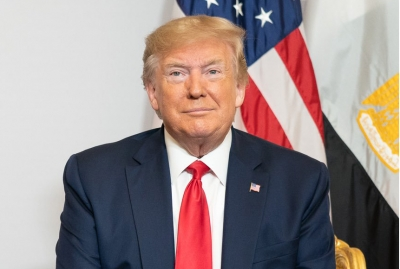America
Election setback for Trump poses dilemmas for him, Democrats

New York, Nov 5
Three marquee elections and a referendum, a setback for US President Donald Trump, threw up dilemmas for both him and the Democrats as they look ahead to the crucial midterm elections next year, where the control of Congress hangs in the balance.
He brushed them off, posting on Truth Social after the voters' verdicts came in Tuesday night, "'TRUMP WASN'T ON THE BALLOT, AND SHUTDOWN, WERE THE TWO REASONS THAT REPUBLICANS LOST ELECTIONS TONIGHT', according to Pollsters".
In the New York City mayoral election and New Jersey's gubernatorial race, Democrats retained control. Democrats took Virginia from the Republicans.
California voters checkmated the Trump-led effort to gain seats for his party in next year's election by redrawing the constituencies in Texas and elsewhere. The voters approved the Democratic drive for constituencies' delimitation, which could reduce the Republican tally by at least five.
Republicans hold 219 seats in the House of Representatives and Democrats 213, and Republicans losing just four seats would change the balance.
As Trump pointed out in his post, the elections were held during a "shutdown" of government due to a "Senate stalemate" over approving funding that each party blames the other for.
Hundreds of thousands of government employees have not been getting paid, even the essential services workers who are working through the shutdown.
The millions of poor, who get subsidised food, are missing out.
Added to this is Trump's tariff war that has already begun to show up on shop shelves. If the trend continues, the full force of the tariffs could be felt before the elections next November. However, it would also be a stretch to conclude just from the scattered polls on Tuesday.
The Democrats, too, have their dilemma in trying to recover from their losses in last year's elections. They have been struggling to come up with a coherent message for the voters, and two competing outlooks are trying to define the party.
In Zohran Mamdani's win in New York's mayoral race, the Democratic Socialists, the party's radical wing, scored two victories.
One was over the party's establishment, represented by Mayor Eric Adams and former Governor Andrew Cuomo, who were defeated by Mamdani in the party primaries for the nomination.
The other was over Trump, who vociferously attacked Mamdani and backed the defeated Cuomo, who ran as an independent.
Mamdani said in his victory speech that he had opened a new course for the party and declared, "No longer will we have to open a history book for proof that Democrats can dare to be great."
But both Mikie Sherrill, who won in New Jersey, and Abigail Spanberger, the winner in Virginia, hewed to a moderate, centralist line.
California Governor Gavin Newsom, who spearheaded the referendum effort, is also a moderate and a likely contender for the Democratic Party's presidential nomination next year.
In many places, Democrats have to draw the support of uncommitted voters in the middle, and a radical agenda that enthuses voters in a big liberal city may turn them off elsewhere. For this, they would have to fend off the Socialists.
Senate Democratic Party Leader Chuck Schumer and even former President Barack Obama did not endorse Mamdani, and some opposed him out of fears that they could lose the middle if the Republicans tainted them by association with him.
But the common denominator for the four Democrats was the focus on the economy and playing down the culture and identity issues, like whether boys who claim to be transgender should be allowed in girls' bathrooms in schools.
In the presidential election, Trump focused on the economy while wading into some cultural issues.
While the high inflation of former President Joe Biden's era may have been tamed, prices have not come down and are only creeping more slowly.
Trump gives more attention to international issues, aggressive immigration crackdowns, and nailing his adversaries, which do not resonate with voters as much as financial matters would.
His tariffs, reshoring, and foreign investments might transform the US, but that will not be before next year's elections, and voters may face the fallout of the tariff wars, unless he can contain them or come up with another mesmerising message for voters.



































